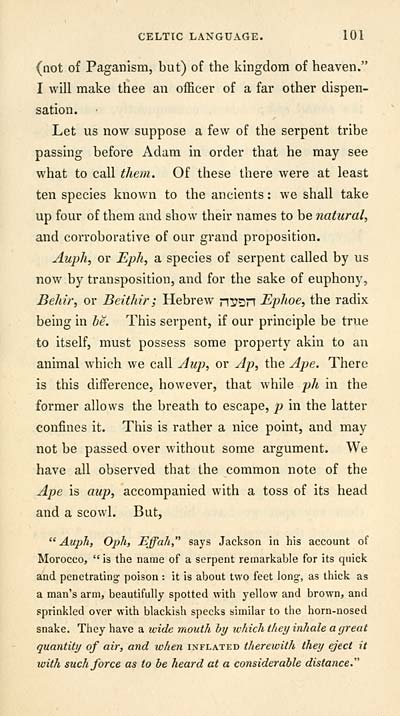Download files
Complete book:
Individual page:
Thumbnail gallery: Grid view | List view

CELTIC LANGUAGE. 101
(not of Paganism, but) of the kingdom of heaven."
I will make thee an officer of a far other dispen-
sation.
Let us now suppose a few of the serpent tribe
passing before Adam in order that he may see
what to call them. Of these there were at least
ten species known to the ancients : we shall take
up four of them and show their names to be natural,
and corroborative of our grand proposition.
Auph, or Eph, a species of serpent called by us
now by transposition, and for the sake of euphony,
Behir, or Beithir; Hebrew n'S^'n Bphoe, the radix
being in be. This serpent, if our principle be true
to itself, must possess some property akin to an
animal which we call yiup, or Jp, the Ape. There
is this difference, however, that while ph in the
former allows the breath to escape, p in the latter
confines it. This is rather a nice point, and may
not be passed over without some argument. We
have all observed that the common note of the
Ape is aup, accompanied with a toss of its head
and a scowl. But,
" Auph, Oph, Effah" says Jackson in his account of
Morocco, " is the name of a serpent remarkable for its quick
and penetrating poison : it is about two feet long, as thick as
a man's arm, beautifully spotted with yellow and brown, and
sprinkled over with blackish specks similar to the horn-nosed
snake. They have a wide mouth by ichich they inhale a great
quantity of ai?; and when inflated therewith they eject it
with such force as to be heard at a considerable distance."
(not of Paganism, but) of the kingdom of heaven."
I will make thee an officer of a far other dispen-
sation.
Let us now suppose a few of the serpent tribe
passing before Adam in order that he may see
what to call them. Of these there were at least
ten species known to the ancients : we shall take
up four of them and show their names to be natural,
and corroborative of our grand proposition.
Auph, or Eph, a species of serpent called by us
now by transposition, and for the sake of euphony,
Behir, or Beithir; Hebrew n'S^'n Bphoe, the radix
being in be. This serpent, if our principle be true
to itself, must possess some property akin to an
animal which we call yiup, or Jp, the Ape. There
is this difference, however, that while ph in the
former allows the breath to escape, p in the latter
confines it. This is rather a nice point, and may
not be passed over without some argument. We
have all observed that the common note of the
Ape is aup, accompanied with a toss of its head
and a scowl. But,
" Auph, Oph, Effah" says Jackson in his account of
Morocco, " is the name of a serpent remarkable for its quick
and penetrating poison : it is about two feet long, as thick as
a man's arm, beautifully spotted with yellow and brown, and
sprinkled over with blackish specks similar to the horn-nosed
snake. They have a wide mouth by ichich they inhale a great
quantity of ai?; and when inflated therewith they eject it
with such force as to be heard at a considerable distance."
Set display mode to: Large image | Transcription
Images and transcriptions on this page, including medium image downloads, may be used under the Creative Commons Attribution 4.0 International Licence unless otherwise stated. ![]()
| Early Gaelic Book Collections > Blair Collection > History of the Celtic language > (107) |
|---|
| Permanent URL | https://digital.nls.uk/76179786 |
|---|
| Description | A selection of books from a collection of more than 500 titles, mostly on religious and literary topics. Also includes some material dealing with other Celtic languages and societies. Collection created towards the end of the 19th century by Lady Evelyn Stewart Murray. |
|---|
| Description | Selected items from five 'Special and Named Printed Collections'. Includes books in Gaelic and other Celtic languages, works about the Gaels, their languages, literature, culture and history. |
|---|

